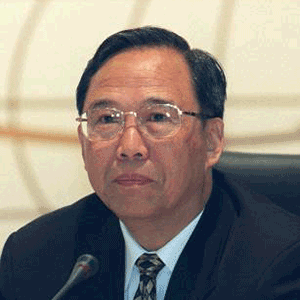
Pursuing Sustainable & Scientific Growth in Productivity & Performance
Date: 8th-10th October 2006

Zeng Peiyan,
Vice-Premier of the State Council of China
Four Forums/Tracks:
- Globalization and the Development of Productivity
- Green Productivity and Competitiveness
- Urban Development and Regional Economy
- Learning From the Chinese Productivity Revolution
This Congress was organised in partnership with the Chinese Association of Productivity Science and the Shenyang Municipal Government.
The Declaration of the World Productivity Congress XIV
We, the members of the global productivity community, gathered in Shenyang, China by the World Confederation of Productivity Science for its 14th World Productivity Congress under the theme of Pursuing Scientific and Sustainable Growth in Productivity & Performance believe and declare that:
One key to productivity improvement is the development, adoption and integration of advanced technologies. Technology has the potential to change both what we do and how we do it. Science, technology and human creativity are the engines of progress and economic development. National and regional progress is fuelled by research, development and innovation in the arts and sciences of productivity.
However, the rapid development of science and technology and the resulting increases in the production of material goods has resulted in the increasing consumption of natural resources and a collateral damage to the environment of the world we all share.
The concept of sustainable development represents a paradigm shift in how modern society views productivity. Two apparently conflicting views must be reconciled.
First, the human desire for progress is inevitable; and all global citizens should have equal rights to share in the fruits of development.
Second, development must be managed in a manner that protects the earth and its resources for future generations. Human rights must be informed by nature’s laws.
Our view of what is encompassed by the term “productivity” must support harmonious development. It must allow us to cooperate responsibly in nature’s plan; to design and develop materials, products and processes that consume fewer resources and have a benign impact on the environment. And, it must allow us to continue to progress, and to work toward the eradication of poverty, of disease, of hardship.
As a result of the ideas shared at this Congress, we – representing Government officials, policy-makers, experts, scholars, leaders of industry and commerce, from around the globe – declare that we will work together in a harmonious relationship to promote and develop:
- The scientific basis for increasing productivity.
- Structures and processes that permit and promote the simultaneous creation of business value, environmental value and social value.
- Intellectual property protection systems that protect the rights of those engaging in scientific development but do not inhibit wider goals that require the sharing of information and expertise.
- An understanding of the inter-relatedness of organizations and economic activity across all national and regional boundaries.
- International cooperation will mobilize all countries to recognize their place in the ‘global system’ and take concerted actions to play their part in a shared solution.
- Identification, documentation and wide sharing of success stories that demonstrate how the application of the principles of productivity science has been used to create business success, enhance community well-being, improve the environment and improve the quality of life for citizens.
- The co-operation of individuals, organizations and governments across all national, racial and religious boundaries in support of the common good.
- An understanding of the need for the coordinated development of the economy, the environment, and society. This understanding must be shared and acted upon by all – whether state policy-maker, business decision-taker, educator, or individual citizen.
In doing so we will create and distribute wealth in a manner that will support the ultimate productivity outcome – a world at peace.
